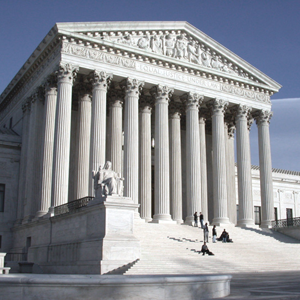 Matters do not lay idle because the Supreme Court is taking its annual summer recess. During its time away from the bench, the Court reviews numerous petitions, motions, and applications, and prepares for arguments calendared for fall. On October 4, 2016, the Court will hear argument in the case of Bravo-Fernandez v. United States.
Matters do not lay idle because the Supreme Court is taking its annual summer recess. During its time away from the bench, the Court reviews numerous petitions, motions, and applications, and prepares for arguments calendared for fall. On October 4, 2016, the Court will hear argument in the case of Bravo-Fernandez v. United States.
The central question in Bravo-Fernandez is whether a vacated, unconstitutional conviction undoes the preclusive effect of a jury acquittal under the collateral estoppel prong of the Double Jeopardy Clause. In May 2005, Bravo-Fernandez, the president of a private Puerto Rican security company, and Martinez-Maldonado, a Puerto Rican senator, traveled to Las Vegas to watch a boxing match between the Puerto Rican boxer Félix “Tito” Trinidad and Ronald Lamont “Winky” Wright. The government alleged that Bravo-Fernandez paid for Martinez-Maldonado’s flight, fight, and accommodations, in exchange for Martinez-Maldonado’s support of two bills related to the security industry in Puerto Rico.
The government charged petitioners with bribery concerning programs receiving Federal Funds, in violation 18 U.S.C. § 666, and other counts stemming from conspiring and traveling to further violate § 666. After a three-week trial, the jury acquitted petitioners of all related charges but convicted them on the underlying § 666 federal bribery charges. The First Circuit Court of Appeals determined that the Puerto Rico District Court improperly instructed the jury on a § 666 bribery conviction, vacated the convictions, and remanded the case. Based on this ruling, the district court entered an order acquitting the defendants, but after lobbying from the government, vacated its line order to clarify that the bribery convictions were vacated. Thereafter, petitioners moved to preclude retrial of the § 666 federal bribery charges on grounds that a rational jury could not have logically acquitted petitioners of conspiring and traveling to violate § 666 without necessarily deciding they did not violate § 666 itself. The court denied petitioners’ motions and the court of appeals affirmed.
The Double Jeopardy Clause of the Fifth Amendment provides that “[n]o person shall . . . be subject for the same offence to be twice put in jeopardy of life or limb.” This constitutional prohibition protects defendants from the ordeal of multiple trials, minimizes the chance that the government will eventually secure a conviction against an innocent defendant, and preserves the finality of judgments. This case would not be before the Supreme Court if the Puerto Rico District Court had, pursuant to the First Circuit’s holding, acquitted petitioners of their federal bribery charges. The novelty of this case is that the Supreme Court has to decide how to treat a vacated conviction for purposes of issue preclusion under the Double Jeopardy Clause.
In Ashe v. Swenson, 397 U.S. 436 (1970), the Court established that the Double Jeopardy Clause includes a collateral estoppel prong, that a jury’s verdict of “not guilty” precludes retrial not only on the same charge, but on any issue the jury necessarily decided to reach the verdict. In United States v. Powell, 469 U.S. 57 (1984), the Court held that, even if logically inconsistent, a jury’s acquittal on one count does not factually preclude its conviction on another count. In Yeager v. United States, 557 U.S. 110 (2009), the Court held that when a jury acquitted on one charge but hung on another, relitigation on the hung count was precluded not because of the jury’s failure to reach a verdict, but because in acquitting on the other charge, the jury decided facts essential to the hung count. In deciding whether the government is precluded from relitigating the vacated federal bribery charges, the Court will have to decide whether to treat them like the logically inconsistent, but valid, conviction in Powell or the hung count in Yeager.
Bravo-Fernandez has massive policy implications. Typical of most indictments, the government saddled Bravo-Fernandez and Martinez-Maldonado with virtually every charge applicable to the alleged statutory violation. If the Supreme Court were to rule in favor of the government, it would risk encouraging charging criminal defendants with every possible related crime and subjecting them to relitigation of every charge that they had not been acquitted of. On the other hand, for the Court to rule in favor of petitioners and apply collateral estoppel would be to presume to stand in the jurors’ shoes. That is, the Court would have determined that certain facts to be afforded preclusive effect were necessarily decided when rendering a logically consistent verdict. The Court may not be prepared to stand there.
